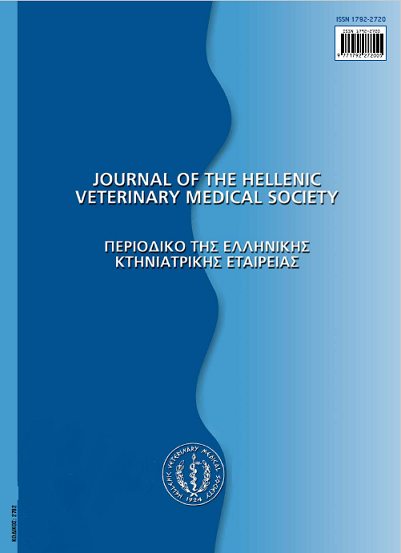Application of liquid chromatography coupled to high-resolution mass spectrometry to measure urinary cortisol in loose housed sows
Resumen
Cortisol is the most common physiological parameter used to measure welfare in pigs. In field studies evaluating stress in individual pigs which are group housed, the collection of spontaneously voided urine is practical. The purpose of the study was to apply a liquid chromatography coupled to high-resolution mass spectrometry approach to observe the patterns of diurnal urinary cortisol excretion among loose sows of three herds. We applied the analytical method in spontaneously voided urine of thirty, repeatedly sampled within a day, multiparous sows of three Greek herds. We found the level of urinary cortisol being highest before morning feeding [geometric mean of urinary cortisol to creatinine ratio being 2.72 (95% confidence interval: 1.17, 6.30), 5.65 (3.15, 10.14) and 2.60 (1.50, 4.50) in sows of herds A, B, and C, respectively] and lowest at 19:00 h [0.56 (0.27, 1.18), 1.24 (0.74, 2.07), 0.88 (0.55, 1.44)]. However, the patterns of diurnal urinary cortisol excretion appeared different among herds.
Article Details
- Cómo citar
-
LEONTIDES, L., DE CLERCQ, N., SKAMPARDONIS, V., LISGARA, M., KONTOPIDIS, G., KATSOULIS, K., VANHAECKE, L., & MAES, D. (2018). Application of liquid chromatography coupled to high-resolution mass spectrometry to measure urinary cortisol in loose housed sows. Journal of the Hellenic Veterinary Medical Society, 67(4), 231–236. https://doi.org/10.12681/jhvms.15643
- Número
- Vol. 67 Núm. 4 (2016)
- Sección
- Research Articles

Esta obra está bajo una licencia internacional Creative Commons Atribución-NoComercial 4.0.
Authors who publish with this journal agree to the following terms:
· Authors retain copyright and grant the journal right of first publication with the work simultaneously licensed under a Creative Commons Attribution Non-Commercial License that allows others to share the work with an acknowledgement of the work's authorship and initial publication in this journal.
· Authors are able to enter into separate, additional contractual arrangements for the non-exclusive distribution of the journal's published version of the work (e.g. post it to an institutional repository or publish it in a book), with an acknowledgement of its initial publication in this journal.
· Authors are permitted and encouraged to post their work online (preferably in institutional repositories or on their website) prior to and during the submission process, as it can lead to productive exchanges, as well as earlier and greater citation of published work.



